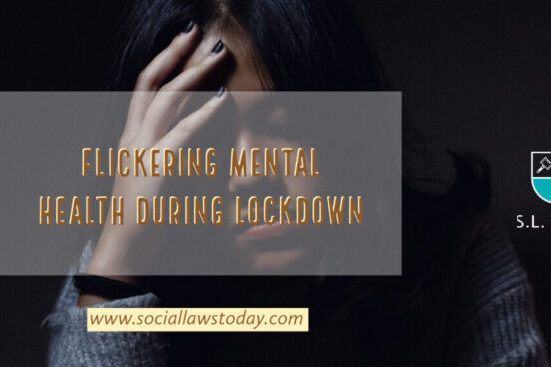Mental Health in Pandemic
Just as how one keeps a check on their physical health, keeping a check on their mental health is also equally important.
Priyanka.K, 30 August, 2020
“The only journey is the journey from within.”
Rainer Maria Rilke
Mental health includes our emotional, psychological, and social well-being.[1] Many factors in our life contribute to mental health problems, like life experiences, family history of mental health problems, etc. Mental health problems are common and are mostly recoverable. According to a study conducted by the National Institute of Mental Health and Neurosciences, 1 in 40 and 1 in 20 people are suffering from past and current episodes of depression in India.[2]One of out every five people in the world go through mental illness such as anxiety, schizophrenia, eating disorders or addictive behaviors. Many people go through mental health concerns but these become a mental illness when the symptoms cause stress and effect one’s ability to process. Here children and adolescents are more prone to experience mental disorders which mostly go untreated or unnoticed . Half of all mental illnesses begin by the age of 14 and mid -20s. Neuropsychiatric conditions are the leading cause of disability in young people in all regions.[3] These children with mental disorders usually face major challenges such as isolation, discrimination, lack of education and care facilities, etc which is a violation of their fundamental human rights. The Mental Health Care Act, 2017 protects and provides the rights of these people.
The Mental Health Care Act:
The Mental Health Care Act was passed on 7 April 2017 replacing the Mental Health Act, 1987 which was criticized for not recognizing the rights of these people . This Act was enacted “to provide for mental health care and services for persons with mental illness and to protect, promote and fulfill the rights of such persons during delivery of mental health care and services for matters connected therewith or incidental thereto.” It further defines “mental illness” as a substantial disorder of thinking, mood, perception, orientation or memory that grossly impairs judgment, behavior, capacity to recognize reality or the ability to meet the ordinary demands of life etc. It ensures that there shall be no discrimination in the treatment decisions and also recognizes the various rights of a mentally ill person. It ensures that every healthcare institute is registered and establishes new improved institutions for treatment. The landmark features of this Act are,
- Section 309 of the Indian Penal Code, which criminalizes attempt to suicide has now been decriminalized, provided that it should be proved that such person was going through grievous stress.
- The Act assures free treatment to those who are homeless or who are unable to access to medical facilities.
- It ensures that every insurer shall make provisions for medical insurance for treatment of mental illness on the same basis as available for treatment on physical illness.
- This Act prohibits the use of Electroconvulsive Therapy for minors and restricts the use of ECT therapy without the use of muscle relaxants and anesthesia.
- It empowers a mentally ill person to have the right to make an advance directive towards the way he/she wants to be treated and who his/her representative shall be.
- This Act further ensures that the government has to set up a Central Mental Health Authority at national level and a State Mental Health Authority in every state.
- This Act also gives an outline of the procedures of admission, treatment and subsequent discharge of the mentally ill person.
- It has also awarded punishment for violations of any provisions under this Act.
ALSO READ: LGBT COMMUNITY DURING COVID-19
AKSHITA PARIHAR
Mental health during the pandemic:
The stress caused due to the fear of the outbreak of the virus has increased the importance of maintaining both physical and mental health care equally. In a recent study by the United States, nearly half (45%) of adults have reported that their mental health has been negatively impacted due to worry and stress over the virus.[4]It is highly common in a pandemic situation to go through fear, anxiety, stress as we are facing real threats with uncertainty. In addition to the fear factor, this virus has also brought about many changes in the daily activities like , change in people’s workspace, no outdoor activities, lack of social gatherings, etc. As the days go by in quarantine it only increases stress and fear with a mix of boredom and anxiety. To think about life pre-pandemic and post-pandemic, about what is going to happen to your college degree or whether your job is still stable or about the economic fluctuations of our country, itself gives rise to a lot of over thinking and stress.
“Just the fact of someone wondering if he is positive for COVID is like having a stigma and something that is threatening his life.. and that affects, of course, his behavior. We know very well that panic leads to bad behavior and to psychosomatic problems as well, and that brings somatic problems very, very, easily and we have to be careful and delicate with how we handle this” says a Neurologist by training, Dr. Petsanis.”[5]
Ways to help improve one’s mental well-being:
“Mental health is not a destination, but a process. It’s about how you drive, and not where you are going.”
It is very important that one looks after their mental health especially when they feel like it has been shattered. It is an integral part of living a healthy, successful and a balanced life. Here are a few ways in which one can balance their mental health,
- Improved sleep pattern
- Yoga/ Meditation
- Regular exercising
- Eating healthy
- Keeping away from negative surroundings
- Relaxing
- Building your mental strength
- Avoiding alcohol or other drugs
- Working productively etc.
Conclusion:
Just as how one keeps a check on their physical health, keeping a check on their mental health is also equally important. Very often we get distracted by all the activities happening around us, that we forget to give some time apart for ourselves. Mental health issues can be different for each one, but it is always advised that one shares and connects with his family or friends and maybe if necessary to even consult a professional. To be precise having mental health issues is nothing to be embarrassed of and that is pretty common and is mostly curable. With the implementation the Mental Health Care Act the government also provides support and protects the rights of such people. Moving further into the current situation the world is facing, it is important that we have a balanced physical plus mental health and stay positive while we fight against this pandemic.
[1] https://www.mentalhealth.gov
[2] https://www.ncbi.nlm.nih.gov/pmc/article/PMC5932926
[3] https://www.who.int
[4] kff.org
[5] https://www.who.int/news-room/feature-stories/detail/facing-mental-health-fallout-from-the-coronavirus-pandemic


Leave feedback about this